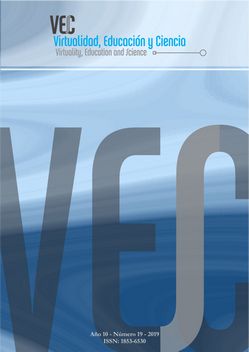Escenarios de aprendizaje diseñados en conjunto por estudiantes y docentes en la universidad: el caso de la asignatura Tecnología Educativa
DOI:
https://doi.org/10.60020/1853-6530.v10.n19.24917Palabras clave:
universidad, tecnologías digitales, diseño de escenarios de aprendizajeResumen
Este estudio se ha propuesto explorar las distintas dimensiones de los escenarios de aprendizaje diseñados en conjunto por estudiantes y docentes en la asignatura Tecnología Educativa de la Licenciatura en Educación de la Universidad Nacional de General Sarmiento. Para ello, se considera la cursada del ciclo 2016, que fue con modalidad virtual. Se analiza, en particular, el trabajo final de la materia que tuvo como objetivo tanto el diseño de una propuesta de enseñanza completamente virtual (en la cual se integraran las tecnologías digitales) como el desarrollo de los recursos de aprendizaje (i.e. entorno y materiales digitales) necesarios para su implementación. A los fines de este análisis, se han tenido en cuenta los principios que rigieron el diseño de las consignas y el modo en que fue llevado a cabo el trabajo. Los resultados dialogan con otras investigaciones centradas en procesos de codiseño que han destacado que este tipo de aproximación promueve los aprendizajes significativos y también las oportunidades para orientar la intervención docente.Referencias
ADELL SEGURA, J., Y CASTAÑEDA QUINTERO, L. (2010) Los entornos Personales de Aprendizaje (PLEs): una nueva manera de entender el aprendizaje. En Roig Vila, R. & Fiorucci, M. (Eds) Claves para la investigación en innovación y calidad educativas. La integración de las Tecnologías de la Información y la Comunicación y la Interculturalidad en las aulas (pp. 19-30). Alcoy, España: Editorial Marfil.
ALA-MUTKA, K, BACIGALUPO, M, KLUZER, S., PASCU, C. PUNIE, Y. Y REDECKER, C. (2009). Learning 2.0: The Impact of Web 2.0. Innovations on Education and Training in Europe. Institute for Prospective Technological Studies. Joint Research Centre. European Commission. Recuperado de http://ipts.jrc.ec.europa.eu/publications/pub.cfm?id=2139 [3/12/2018].
ÁLVAREZ, G. Y BASSA, L. (2016). Estrategias didácticas para promover la escritura colaborativa mediada por tecnologías: hacia el desarrollo de dinámicas expertas en los grupos de trabajo. Exlibris núm. 5, 242-247. Recuperado de http://revistas.filo.uba.ar/index.php/exlibris/article/view/3022/968 [3/12/2018].
BEREITER, C. (2002). Education and mind in knowledge age. Hillsdale: N.J, Lawrence Erlbaum associates.
BEETHAM. H. Y SHARPE, R. (Eds.) (2007). Rethinking Pedagogy for the Digital Age. London: Routledge.
BREW, A. (2006). Research and teaching: beyond the divide. New York: Palgrave Macmillan.
CAMERON, L. y TANTI, M. (2011) Students as learning designers: Using social media to scalfold the experience. Learning Papers, 27. Recuperado de http://www.elearningeuropa.info/en/article/Students-aslearning-designers%3A--Using-social-media-to-scaffold-theexperience [3/12/2018].
CAMERON, L. Y GOTLIEB, C. (2009). Students Participating in the Learning Design Process Using LAMS, en L. Cameron y J. Dalziel (Eds.), Proceedings of the 4th International LAMS Conference 2009: Opening Up Learning Design., pp. 40-47. 3-4th December. 2009, Sydney: LAMS Foundation. Recuperado de http://lamsfoundation.org/lams2009sydney/CD/pdfs/03_Cameron.pdf [3/12/2018].
CONOLE, G., DYKE, M., OLIVER, M. Y SEALE, J. (2004) Mapping pedagogy and tools for effective learning design. Computers and Education, 43, pp. 17–33.
CONOLE, G., OLIVER, M., FALCONER, I., LITTLEJOHN, A., Y HARVEY, J. (2007). Designing for learning, en G. Conole y M. Oliver (Ed.), Contemporary Perspectives in E-learning Research: Themes, methods and impact on practice (Open and Distance Learning Series). Routledge Falmer.
CONOLE, G. (2008). Capturing Practice: The Role of Mediating Artefacts in Learning Design, en Lockyer, L.; Bennett, S.; Agostinho, S. y Harper, B. (Eds.). Handbook of Research on Learning Design and Learning Objects: Issues, Applications and Technologies. Hersey: IGI Global, pp. 187-207.
ELLIS, R. Y GOODYEAR, P. (2010). Students’ experiences of elearning in higher education. The ecology of sustainable innovation. New York y London: Routledge.
GONZÁLEZ, C. (2010). What do university teachers think eLearning is good for in their teaching? Studies in Higher Education, 35(1), pp. 61-78.
HERNÁNDEZ SAMPIERI, R., FERNÁNDEZ COLLADO, C. Y BAPTISTA LUCIO, P. (2006). Metodología de la Investigación. Ed. McGraw-Hill. México. 4ª Edición.
LANKSHEAR, C. Y KNOBEL, M. (2008). Nuevos alfabetismos. Madrid: Morata
LAURILLARD, D. (2006) E-learning in higher education, en P. Ashwin (Ed.), Chaning Higher Education. London: Routledge, 71-84.
GARCÍA, C.; YOT DOMÍNGUEZ, C.; SÁNCHEZ MORENO, M.; MURILLO ESTEPA, P.; MAYOR RUIZ, C. (2011). Diseñar el aprendizaje en la universidad: Identificación de patrones de actividades Profesorado. Revista de Currículum y Formación de Profesorado, vol. 15, núm. 2, pp. 181-198.
MASTERMAN, L. Y VOGEL, M. (2007). Practices and processes of design for learning. En Beetham. H. y Sharpe, r. (Eds.). Rethinking Pedagogy for the Digital Age. London: Routledge, pp. 52-63.
McANDREW, P. y GOODYEAR, P. (2007) Representing practitioner experiences through learning design and patterns. En Beetham, H. and Sharpe, R. (Eds.) Rethinking Pedagogy for a Digital Age. Routledge: London and New York.
REIGELUTH, C. (Ed.). (1999). Instructional design theories and models. Vol 2: a new paradigm of instructional theory. Mahwah NJ: Lawrence Erlbaum Associates.
ROGOFF, B. (1993). Aprendices del pensamiento. El desarrollo cognitivo en el contexto social. Barcelona: Paidós.
ROSCHELLE, J., PENUEL, W. R., Y SCHECHTMAN, N. (2006). Codesign of innovations with teachers: Definition and dynamics. Paper presented at the International Conference of the Learning Sciences, Bloomington, IN.
STRIJBOS, J. W., KIRSCHNER, P. A., Y MARTENS, R. L. (Eds.) (2004). What we know about CSCL: and implementing it in higher education. Boston, MA: Kluwer Academic Publishers.
TRIGWELL, K. Y SHALE, S. (2004) Student learning and the scholarship of university teaching. Studies in Higher Education, 29(4), pp. 523-53.
TRIGWELL, K.; PROSSER, M. Y WATERHOUSE, F. (1999) Relations between teachers’ approaches to teaching and students’ approaches to learning. Studies in Higher Education, 37(1), pp. 57-70.
VYGOTSKY, L. S. (1978). Mind in Society: The Development of Higher Psychological Processes. Cambridge: Harvard University Press.
Descargas
Publicado
Número
Sección
Licencia
Se permite la generación de obras derivadas siempre que no se haga con fines comerciales. Tampoco se puede utilizar la obra original con fines comerciales.


